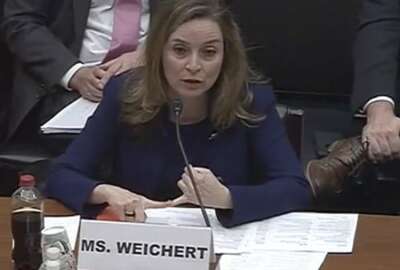
Congress should resist ‘piecemeal’ civil service changes, federal managers say
Federal management organizations are working with the House Oversight and Government Reform Committee to flesh out their ideas for civil service modernization.
Best listening experience is on Chrome, Firefox or Safari. Subscribe to Federal Drive’s daily audio interviews on Apple Podcasts or PodcastOne.
A coalition of federal managers organizations has offered up its ideas and recommendations for modernizing the civil service system to the House Oversight and Government Reform committee.
The Government Managers Coalition, which represents about 225,000 federal managers, supervisors and executives, has told Congress it’s ready to “roll up [its] sleeves” and help drive the conversation on the ambiguous and complex topic of “civil service modernization.”
The coalition, which includes the Senior Executives Association, Federal Managers Association, Professional Managers Association, National Council of Social Security Management Associations and FAA Managers Association, shared its ideas with House Oversight and Government Reform Government Operations Subcommittee Chairman Mark Meadows (R-N.C.).
It also offered some advice.
“The most significant challenge facing Congress and the administration is to resist piecemeal changes to federal human capital modernization, and to instead work together to address comprehensive, long-lasting reforms that will provide agency heads and human resource managers with the necessary tools and guidance on how to recruit, develop and retain the federal workforce of the future,” the coalition wrote in a July 16 letter.
The coalition’s ideas are simply recommendations, but they may guide the House oversight committee as it attempts to draft new legislation that supports the Trump administration’s goals for the federal workforce. The administration outlined a variety of goals for modernizing the workforce in the President’s Management Agenda.
Lawmakers, particularly those on the House Oversight and Government Reform Committee, have attempted to shorten the time employees have to appeal a disciplinary action, lengthen the probationary period and alter official time through individual pieces of legislation.
But Congress should approach the topic of civil service modernization holistically, the coalition said. Some proposals will need Congress to authorize regulatory changes, while others will prompt cultural changes in how agencies “manage and identify talent.”
But Congress shouldn’t rely on the approach it’s taken in recent years: drafting and passing standalone legislation that pick apart pieces of a challenge at a specific agency. The coalition cited the Veterans Access, Choice and Accountability Act, which Congress passed in reaction to wait-time scandals at VA, as an example where lawmakers inadvertently “made the system harder to manage.”
The groups’ recommendations are in reaction to a request from Meadows. In a May hearing on the Trump administration’s federal workforce agenda, Meadows asked the Senior Executives Association, Partnership for Public Service and American Federation of Government Employees to submit their thoughts on civil service modernization.
The Partnership had listed 10 specific civil service modernization ideas in its May 16 testimony. The managers coalition used the Partnership’s original list as a starting point to expand on its own thinking.
The Government Managers Coalition found it hard to argue with the Partnership’s recommendations and took Meadows’ call for ideas as an opportunity to flesh them out with more detail, said Jason Briefel, SEA’s executive director.
It’s also a chance to band together and start a conversation that’s been largely fragmented and often divisive among federal groups, Congress and employee unions. Though the oversight committee found some agreement among the witnesses, it also encountered contested debate during its May 16 hearing.
Some of the coalition’s ideas — establish market incentive pay, for example — would be more controversial, while others are more straightforward.
First, Congress can start by helping agencies better develop career leaders, the coalition said.
The GMC offered several specific recommendations, such as using a shared services model to create a centralized training center for employees and managers at all agencies and requiring a joint duty program for GS-15s, rather than senior executives.
Congress needs to change the General Schedule, but lawmakers could tackle part of the problem by creating a dual-promotion track for supervisors and technical specialists.
“Technicians and subject matter experts are promoted into supervisory roles in order to earn promotions, even as many do not actually wish to manage people and, indeed, often lack the political, negotiation and interpersonal skills necessary to successfully do so,” the coalition wrote.
Coalition recommends capping number of political appointees
The management groups also recommended a cap on the number of political appointees. Agencies should consider reducing the percentage of permitted non-career Senior Executive Service members from 25 to 15 percent of an agency.
The coalition recommended cutting the number of political appointees who need Senate confirmation and designating agency assistant secretaries for management or administration as career reserved positions, the coalition said.
Converting more management positions to “career reserved” would also cut down on the number of vacancies agencies have during presidential transitions, the coalition said.
Federal employee unions have expressed a similar frustration with the number of management layers in government. The National Treasury Employees Union, for example, has said its members are frustrated by the supervisor-to-employee ratio.
Hiring and firing procedures also need a comprehensive review, the GMC said.
“The current adverse actions and appeals process is so complex and cumbersome that many managers are reluctant to go through the seemingly endless steps of addressing employee conduct issues,” the groups wrote. “This reluctance is compounded with challenges in the hiring arena, where managers often decide to keep a suboptimal employee because the alternative is having no employee at all to perform necessary duties.”
Congress should establish a single adjudicative entity to hear employees’ disciplinary appeals, the coalition offered as one recommendation.
In addition, the coalition said the pay and classification system needs a “comprehensive overhaul.” Its recommendations include a limit on pay raises to two types of salary adjustments a year and an elimination of time-in-grade requirements.
But pay changes won’t resolve every challenge, the coalition warned.
“Absent the creation of a strong and professionalized talent management and assessment system, pay reform will not be as effective in meeting government needs as it could and should be,” the letter said.
Copyright © 2025 Federal News Network. All rights reserved. This website is not intended for users located within the European Economic Area.
Nicole Ogrysko is a reporter for Federal News Network focusing on the federal workforce and federal pay and benefits.
Follow @nogryskoWFED
Related Stories





